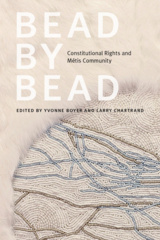Moving Aboriginal Health Forward
Discarding Canada’s Legal Barriers
Continuing the theme of social determinants of health, this book is an historical examination of Canadian legal regimes and the negative impact they have had on the health of Aboriginal peoples. Everything from the early ban on traditional practices to the constitutional division of powers is examined (including who is responsible for off-reserve Indians under the Constitution). The author argues there is a clear connection between the health of individuals and the legal regime under which they live, and that our legal regime is one of the determinants of health. She contrasts the state of Aboriginal health in pre-contact days with their health today.
The book provides comprehensive reviews of both health statistical data, historical practices aimed at Aboriginal peoples, and an analysis of legal principles that have developed in Canadian law as it applies to Aboriginal peoples. It outlines how commitments made by treaty and Supreme Court of Canada rulings on Aboriginal rights, the duty to consult, and the special constitutional status of Aboriginal peoples can be used to advance the health of Aboriginal peoples. The book concludes with a practical framework for the reconciliation of Aboriginal health and healing practices within Canadian society.
By including several different First Nations groups, as well as the Métis and Inuit in her analysis, the author adds a richness to the discussion and refrains from oversimplifying distinct histories and traditions.
Yvonne Boyer currently holds the Canada Research Chair in Aboriginal Health and Wellness at Brandon University. She is a member of the Métis Nation of Saskatchewan and owns Boyer Law Office, where she specializes in providing holistic services that blend mainstream law with Indigenous laws. With a background in nursing, she has more than 15 years of experience practicing law and publishing extensively on the topics of Aboriginal health and how Aboriginal and treaty law intersects on the health of First Nations, Métis, and Inuit.
Yvonne received her Bachelor of Laws from the University of Saskatchewan, Master of Laws and Doctorate of Laws from the University of Ottawa,and in 2012 completed a post-doctoral fellowship at the Indigenous People’s Health Research Centre. Yvonne volunteers her time and expertise with several organizations, and most notably she is a mother to four children, with one grandchild, and more on the way.
Introduction
Part One
1 Health Determinants
2 Aboriginal Society and Good Health
3 Historical Health Influences
Part Two
4 The Law is a Determinant of Health
5 Aboriginal and Treaty Rights to Health
Notes
Bibliography
Index








